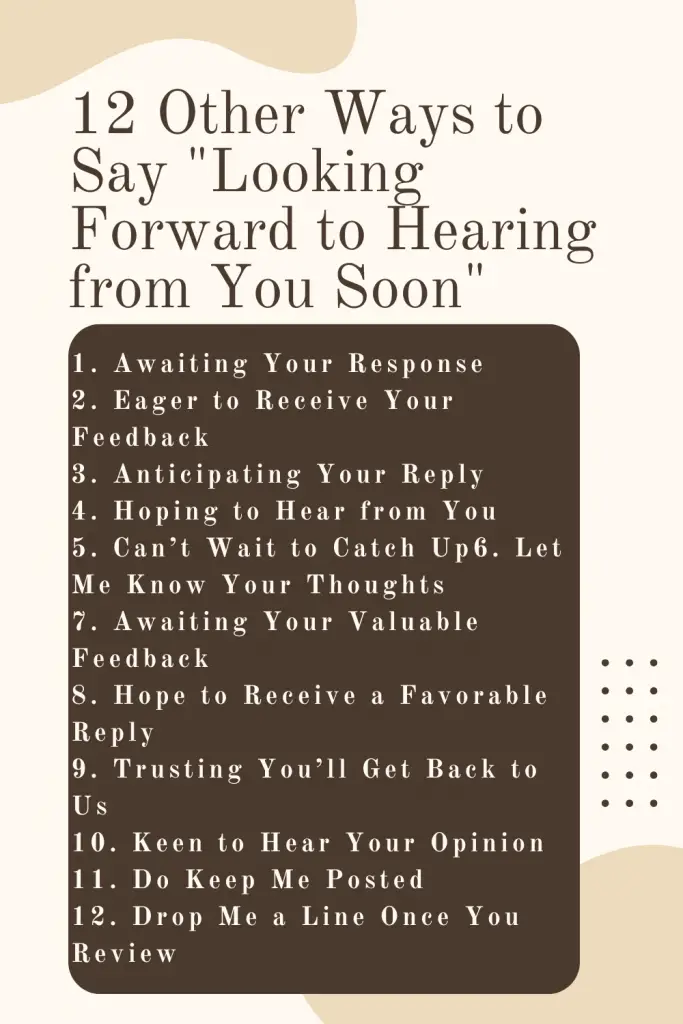There are probably a bunch of times when you gotta tell someone I’m eager to hear back from you – whether it’s job-related, waiting on feedback for a proposal, or just wanting to hear from a friend. We mean, when you’re waiting to find out about something you obviously want to show that you’re excited for their response.
“Looking forward to hearing from you soon” is the main way people say it, but there are actually a ton of other ways to say the same thing in English. Using different phrases can make what you’re saying sound more unique, and also show your relationship with who you’re talking to and the situation.
In this article, we’re going share some other ways to say looking forward to hearing from you soon that have different tones and contexts.
Other Ways to Say “Looking Forward to Hearing from You Soon”
The ability to articulate your thoughts in a unique and varied way adds flavor to your communication. Here are some other ways to convey an expectation of a response or response:
Formal and Professional Settings
1. Awaiting Your Response
Example: “I am eagerly awaiting your response to our proposal.“
Meaning: Indicates a status waiting for a response. It’s a respectful way of saying you’ve done your part and it’s the receiver’s turn. Emphasizes patience and the importance of the forthcoming answer.
Usage: Common in official correspondence, often used after making a formal request or inquiry.
2. Eager to Receive Your Feedback
Example: “I am eager to receive your feedback on the report I submitted.“
Meaning: Expresses a heightened sense of anticipation and interest in receiving feedback or a decision about something that has been presented, often emphasizing the importance or urgency of the matter.
Usage: Often used in business communication after sharing a proposal or important document.
3. Anticipating Your Reply
Example: “We are anticipating your reply to our invitation to the conference next month.“
Meaning: Expresses an expectation of an impending response, implying that preparations or arrangements may be made based on the expected response.
Usage: Appropriate in a professional context, such as after sending conference invitations or important notices.
Casual and Friendly Settings
4. Hoping to Hear from You
Example: “Hey! Sent you the details about the trip. Hoping to hear from you soon!“
Meaning: Expresses a warm and friendly desire to receive a message from the recipient. This shows that the sender values the receiver’s point of view or simply wants to keep in touch.
Usage: Common among friends or informal settings after sharing information or asking for input.
5. Can’t Wait to Catch Up
Example: “Sent you an update on the reunion plans. Can’t wait to catch up and hear your thoughts!“
Meaning: Expresses excitement and desire to reconnect or discuss recent events or plans. This shows a sense of camaraderie and enthusiasm about the relationship or upcoming discussions.
Usage: Ideal after sharing plans, updates, or scheduling a meeting with friends or acquaintances.
6. Let Me Know Your Thoughts
Example: “I shared some book recommendations with you. Let me know your thoughts once you check them out!“
Meaning: A relaxed and open invitation for someone to share their opinions, feelings, or feedback on a topic. It means the sender’s value from the receiver’s point of view.
Usage: Used among friends or in a relaxed setting after recommending something or sharing ideas.
Business Settings
7. Awaiting Your Valuable Feedback
Example: “We have implemented the changes you suggested and are awaiting your valuable feedback.“
Meaning: Emphasizes the importance and value of the feedback to the recipient. By defining feedback as “valuable,” it acknowledges the expertise or importance of the recipient’s perspective in the given context.
Usage: Suitable after making changes based on someone’s suggestions in a professional environment.
8. Hope to Receive a Favorable Reply
Example: “We submitted our application for the partnership program and hope to receive a favorable reply.“
Meaning: Expresses optimism for a positive outcome while subtly indicating the importance or desirability of such an outcome to the sender.
Usage: Often used after submitting applications, proposals, or important business documents.
9. Trusting You’ll Get Back to Us
Example: “We’ve forwarded the contract details and are trusting you’ll get back to us with your input.“
Meaning: This expression expresses belief in the recipient’s willingness or responsibility to respond. It is a combination of expectation and respect for the receiver’s role in the communication process.
Usage: Appropriate in professional communications when you expect feedback or an answer on an important matter.
Innovative Variations
10. Keen to Hear Your Opinion
Example: “Shared the design drafts with you and am keen to hear your opinion.“
Meaning: Expresses a strong and genuine interest in the recipient’s point of view, emphasizing that their thoughts are not just wanted but eagerly awaited, perhaps because of their unique perspective or experience.
Usage: Ideal when looking for feedback on creative projects, designs, or innovative ideas.
11. Do Keep Me Posted
Example: “Would appreciate it if you could review the documents and keep me posted.“
Meaning: A polite and somewhat informal request for current updates on a situation or issue. This highlights the sender’s sustained interest in the subject.
Usage: This can be used in both semi-formal and casual contexts, especially after sharing documents or information.
12. Drop Me a Line Once You Review
Example: “Please drop me a line once you review the itinerary I shared.“
Meaning: A colloquial way of requesting a brief communication, often an update or feedback, after the recipient has had a chance to review the material provided. Emphasizes the desire for a short, timely response.
Usage: Appropriate in situations where you have shared material for review and are waiting for a quick response or feedback.

When to use different expressions
It’s essential to use expressions that match the tone and context of your message.
For instance, in professional and business communication, it’s preferable to maintain a more formal tone. Using phrases like “Awaiting Your Response” or “Anticipating Your Reply” can reflect respect and formality.
In more relaxed and casual exchanges, especially with friends or family, using laid-back phrases such as “Hoping to Hear from You” or “Let Me Know Your Thoughts” can keep the communication friendly and warm.
Conclusion
As highlighted in an article from Harvard Business Review, the ending of a message can significantly influence its overall perception. So the next time you’re waiting for feedback, a response, or just want to hear back from someone, remember that there are plenty of other ways to say “I look forward to hearing from you soon” to make your message stand out. Choose expressions that fit the context, reflect your relationship with the recipient, and most importantly, sound sincere.
FAQs
Is “Looking Forward to Hear from You Soon” grammatically correct?
No, the correct phrase is “Looking forward to hearing from you soon.” The structure “looking forward to” is followed by a gerund (verb+ing form), so “hearing” is the appropriate word to use.
Can “Looking Forward to Hearing from You Soon” be used in formal settings?
Yes, it’s commonly used in formal correspondence, especially in business and professional emails, to convey anticipation and to encourage a timely response. However, context is important, and there might be more appropriate alternatives depending on the nature of the message.
When should I avoid using the phrase?
You might want to avoid this phrase when:
● The matter is extremely formal or requires a more bespoke closing.
● The recipient has not committed to responding or it is not their responsibility to do so.
● Overuse could make your messages seem routine or insincere.
Does the phrase sound too pushy or demanding?
Not necessarily. “Looking forward to hearing from you soon” conveys anticipation more than it does demand. However, the tone can vary based on the overall context of the message. If the preceding content is forceful or urgent, this phrase might add to that intensity.
Can I use this phrase in a job application or interview follow-up?
Yes, it’s appropriate in these contexts as it indicates enthusiasm and eagerness. However, make sure to balance it by showing gratitude for the opportunity to apply or for the interview.









